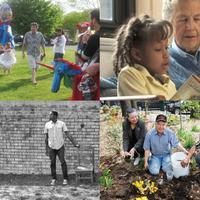We are pleased to announce the online availability of ICZs – A Compendium of Applications at:
http://extension.psu.edu/youth/intergenerational/articles/intergenerational-contact-zones
This online publication draws on a meeting held at the Oxford Institute of Population Ageing on ICZs (26 June 2015) during which a multi-disciplinary group of 13 scholars and practitioners engaged in groundwork discussions and collaborative inquiry aimed at exploring existing approaches and charting new strategies for creating and/or enhancing intergenerational spaces.
This 14-chapter online resource is intended to serve as an aid in conceptualizing and designing spaces for intergenerational living and learning. Such spaces are called “intergenerational contact zones,” and are spatial focal points for different generations to meet, interact, build relationships and, if desired, work together to address issues of local concern.
The chapters of this publication are filled with examples of how ICZs can help breathe new life into communities and social practices. Implications are explored for creating community settings that welcome age- and generation- diverse populations, provide opportunities for meaningful intergenerational engagement, and, in some way(s), enrich community life.
This publication is a part of a broader effort to crystalize our understanding of the overall ICZ concept and explore new applications for creating livable, inclusive, and relationship-focused community settings for people of generations. Some of these applications involve settings that are not typically thought of as hubs of intergenerational activity or possibility, such as small, sparse bus stops (see Jason Danely's chapter), abandoned castles slated for restoration and adaptive re-use (see Tom Quinlan's chapter), and online gaming platforms designed for family play (see Eyu Zang and Leng Leng Thang’s chapter).
This Compendium publication is largely an exploratory piece as a way to introduce more people to the ICZ concept and some of its many applications – your comments are welcomed. For more background see the following blog posts by Jaco Hoffman and Matt Kaplan 'Intergenerational Contact Zones: What and Why?' and Claudia Azevedo 'How to take advantage of existing city parks’ infrastructure to promote intergenerational programmes?'










.svg_square_xs.jpg)






